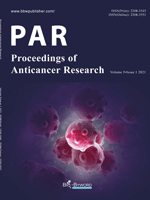Abstract
Objective: To study the therapeutic effect of endoscopic submucosal dissection and mucosal resection on gastric neuroendocrine tumor. Methods: A hundred patients with gastric neuroendocrine tumor that were treated in the Affiliated Hospital of Chifeng University from January 2016 to May 2021 were randomly selected for this research. They were divided into two groups, which were the control group (endoscopic mucosal resection) and the study group (endoscopic submucosal dissection), by the digital table method. The curative effects of the two groups were observed and compared. Results: Before operation, there were no significant differences in serum CgA, TNF-?, and IL-6 between the two groups, p > 0.05. After surgical treatment, the operation time and hospital stay of the patients in the study group were shorter than those in the control group, the amount of surgical bleeding was also less compared to the control group, and the complete tumor resection rate was higher than that in the control group (p < 0.05); the levels of IL-6 and CgA of the study group were lower than those in the control group, while the levels of TNF-? were higher than those of the control group, p < 0.05; the postoperative complication rate of the study group was lower than that of the reference group (p < 0.05). Conclusion: Endoscopic submucosal dissection is more effective for gastric neuroendocrine tumors. The resection rate of the tumor is high, and the operation risk is low.
References
Yuan JP, Ma D, Wu S, et al., 2019, Analysis of Risk Factors for Incomplete Resection of Rectal Neuroendocrine Neoplasms after Endoscopic Submucosal Dissection. Chinese Journal of Practical Internal Medicine, 039(004): 367-370.
Zhao P, Tan XM, Li WD, et al., 2019, Efficacy and Safety of Endoscopic Mucosal Dissection and Mucosal Resection in the Treatment of Early Gastrointestinal Neuroendocrine Tumors. Chinese Journal of Difficult and Complicated Cases, 018(010): 1006-1008, 1012.
Xia YX, Fang L, Zhang M, et al., 2020, Clinical Efficacy and Safety of Endoscopic Submucosal Resection and Endoscopic Submucosal Dissection in the Treatment of Early Gastric Cancer. The Practical Journal of Cancer, 35(12): 122-124, 153.
Kobara H, Miyaoka Y, Ikeda Y, et al., 2020, Outcomes of Endoscopic Submucosal Dissection for Subepithelial Lesions Localized Within the Submucosa, Including Neuroendocrine Tumors: A Multicenter Prospective Study. Journal of Gastrointestinal and Liver Diseases: JGLD, 29(1): 41-49.
Wu LJ, Tian XX, Jin JJ, et al., 2020, Therapeutic Effect Observation of Ligation Device Assisted Endoscopic Submucosal Resection Compared with Stripping in the Treatment of Small Rectal Neuroendocrine Tumors. The Practical Journal of Cancer, 035(004): 624-627.
Ma Y, Du FF, 2020, Effect of Endoscopic Submucosal Dissection on Gastrointestinal Neuroendocrine Tumors and Its Effect on Serum VEGF and CgA. Hebei Medical Journal, 42(04): 47-50.
Zhao P, Tan XM, Li WD, et al., 2019, Efficacy and Safety of Endoscopic Mucosal Dissection and Mucosal Resection in the Treatment of Early Gastrointestinal Neuroendocrine Tumors. Chinese Journal of Difficult and Complicated Cases, (10): 1006-1008.
